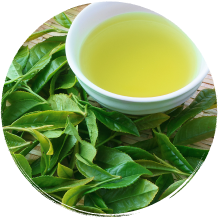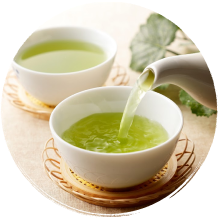Health Benefits of
Japanese green tea Tea Science Tips


Japanese tea, known for its
characteristic astringency,
bitterness,
and deliciousness (umami),
contains many components that are
beneficial to
human health.
This page explains the beneficial
properties of green tea
and how to
drink it to fully reap its benefits.


Green tea improves physical and mental health
Green tea is believed to improve physical and mental health, and its health benefits are associated with the components found in green tea.
Research has revealed that the unique components found in green tea, including catechin, caffeine and theanine, have a positive impact on physical and mental health. These components have an antioxidative effect, a blood pressure lowering effect as well as brain calming effect. Therefore, the habitual consumption of green tea is recommended.
The consumption of green tea can help maintain physical and mental health and lower the risks of lifestyle-related diseases.



Beneficial properties of green tea
Green tea is believed to lower the risks of lifestyle-related diseases, while also having a blood pressure lowering effect, relaxing effect, fatigue reducing effect as well as producing a positive impact on mental health. Let's take a closer look at each property associated with green tea.
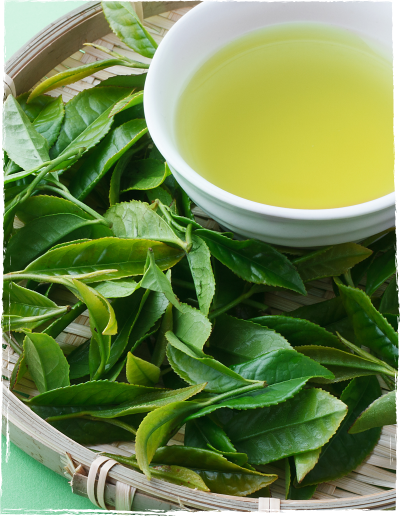


Prevention of lifestyle-related diseases
Since ancient times, green tea has been used as a health maintenance tool.
Now, more people are paying attention to the multiple health benefits of green tea, particularly its effect on the prevention of lifestyle-related diseases. Anti-oxidants found in green tea, such as catechin, are believed to lower the risks of lifestyle-related diseases including cerebral vascular diseases, cardiac diseases, hypertension and arteriosclerosis. These components are believed to lower the risks of developing these diseases by reducing oxidative stress in the body and keeping blood vessels healthy.


Effect on body fat
Catechin found in tea is reported to have a cholesterol lowering effect, and also help reduce body fat. Gallate-type catechin, a type of catechin, is particularly useful in the reduction of the absorption of dietary fat, allowing you to appreciate its effect on body fat as you dine.


Relaxing effect
Green tea is believed to have a relaxing effect. One component, theanine, improves blood circulation by relaxing tense muscles and widening blood vessels, which produces a relaxing effect and relieves stress.
The consumption of green tea helps calm your mind and achieve peace of mind when you are facing a busy schedule. Why not drink green tea to relax and stay healthy both physically and mentally.


Fatigue reducing effect
The intake of Japanese tea before or during a task, such as desk work, improves performance and helps reduce the feeling of fatigue, suggesting that even a small amount of tea easily consumable in daily life can reduce stress in a short period of time. People who are engaged in creative professions, such as people who work at IT companies, favor tea. In the US, tea is known as a beverage that inspires creativity. Sipping Japanese tea slowly while working a desk job was found to help heighten the feeling of relaxation, improve performance and reduce the subjective feeling of fatigue.

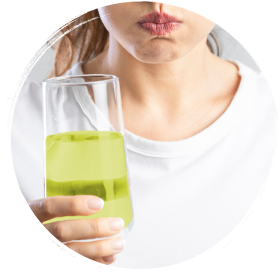
Influenza prevention
The catechin found in tea is known to have an antiviral effect. Cell culture experiments have found that catechin inhibits the transmission of both influenza A and B viruses. Gargling with green tea as a way to prevent colds and influenza is widely known in Japan. It is also recommended to consume green tea daily before, during, and after the flu season.

How to drink green tea to fully reap its benefits
Green tea pairs well with any meal. You may find yourself drinking it excessively from time to time. However, caution is necessary if you wish to fully reap its benefits. This article explains the recommended daily amount of green tea and how to brew it.
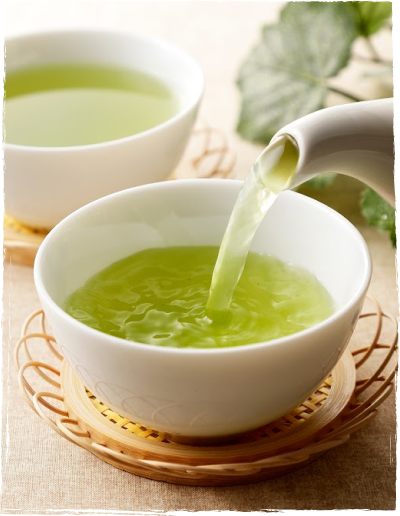


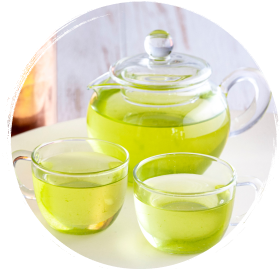
Recommended daily amount
Green tea has multiple health benefits but excessive consumption may lead to issues. The excessive consumption of the caffeine found in green tea can cause an elevated heart rate, diarrhea and nausea. It appears to be safe for most adults to drink up to two liters of green tea daily. It ensures you consume an appropriate amount of anti-oxidants, vitamins and minerals, while at the same time limiting caffeine intake so that safety concerns are not raised. (The limit varies according to individual.)
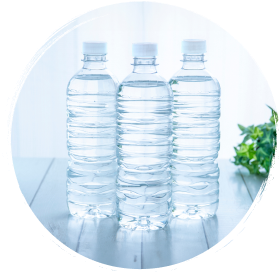
Use soft water to brew green tea
The type of water matters in green tea brewing. Hard water will react with the catechin and caffeine in green tea, resulting in a bland taste, poor aroma and cloudy water color. Soft water contains fewer minerals, such as magnesium and calcium, than hard water, and so it is more suitable for enhancing the unique taste and aroma of green tea.







